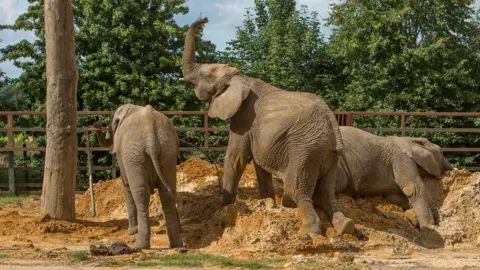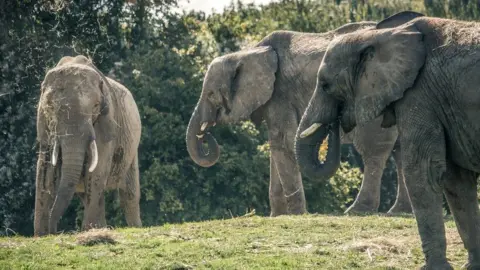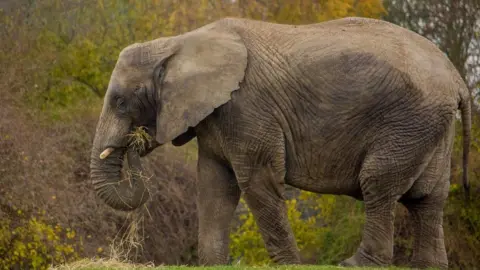Carrie Johnson's charity in 'world first' elephant rewilding project
 David Rolfee / The Aspinall Foundation
David Rolfee / The Aspinall FoundationAn animal charity is planning to fly 13 elephants to Africa to rewild them in what it claims is a "world first".
The breeding herd would be flown to southern Kenya from the Howletts Wild Animal Park in Kent in bespoke crates.
The park is run by animal conservation group The Aspinall Foundation, which employs the prime minister's wife, Carrie Johnson.
Foundation chairman Damian Aspinall said: "It's unquestionably the biggest task we have undertaken."
The herd - which includes three calves - live in an enclosure at the park near Canterbury.
"As happy as they are in Kent, they don't belong here," Mr Aspinall said.
Ecologist Ben Okita, director of conservation, policy and planning at Save the Elephants, warned past rewilding projects had struggled.
However, he said it would be difficult to judge the scheme's chances of success without knowing the full details.
How the animals come to integrate with their fellow elephants and wild animals - not to mention human inhabitants - would all play a major role, said Dr Okita, who is co-chair of the African elephant specialist group at the International Union for Conservation of Nature (IUCN).
The transport alone could be dangerous, with the elephants' high intelligence making their requirements particularly complex, he added.
 The Aspinall Foundation
The Aspinall FoundationMr Aspinall told BBC Radio Kent: "Elephants don't do well in captivity. Hardly any are born. Females live to about half their natural life.
"Over half the elephants in captivity are obese. They suffer foot problems, skin problems, mental distress."
Mr Aspinall admitted the project, which he said was a "world first", had "big risks".
But he said: "We are trying to do everything to mitigate discomfort for these animals."
 The Aspinall Foundation
The Aspinall FoundationThe herd, which weighs 25 tonnes, will travel in bespoke crates with veterinary support, he explained.
"Once they have got used to walking in and out of the crates, the hope is to get them onto lorries, and onto a direct flight to Africa."
Mr Aspinall said it could take up to a year after arriving before the animals are properly settled.
Two different sites in Kenya are currently under consideration for the project.
Mr Aspinall added: "Once they get out there, they are going to be so happy, wandering about, meeting other wild elephants, breeding.
"I think we would have done something good in the world if we can achieve this."
Dr Okita agreed it would be hugely positive if the scheme succeeds.
"Coming back home is always [positive] for any species," he added.
Boris Johnson's wife is head of communications at The Aspinall Foundation.

